|
Part 1 – Introduction, Morocco & Dishonored
The Motion Picture Production Code, drawn up by self-serving puritans to restrict what could be shown on screen in American movies, was a preposterous thing. Its authors claimed that Hollywood was a corrupting force and that they were protecting a vulnerable public. This is, of course, complete and utter bollocks. What the Production Code did was prevent films from depicting life as it is and present instead a sanitised version that did not exist in the real world, except in the minds of those who drew up and enforced the Code. Primarily as a result, we have come to expect American films from the 1930s and 40s to be a little coy when it comes to anything relating to sex and sexuality. Sure, a few wily filmmakers found a way to sneak coded messages in that the censors missed, but to be open about such a glorious aspect of human existence in a Hollywood film was just not on the cards. What is easy to forget is that the Production Code did not come into effect until 1934. That's 5 years of sound cinema before risqué elements of films were firmly stamped out by the censorial foot of the Hays Office. Thus, when you encounter a film made during this small but important window that does push the boundaries of the day a little, it can come as a jolt. The idea that something that was permissible in 1930 would not even make it past the script stage five years later just doesn't make sense.
Josef von Sternberg is one of a small handful of now-legendary filmmakers whose work I am not as familiar with as I should be. Unlike the pride-swallowing admission that I had to make back in 2008 that I'd never seen any Satyajit Ray films before embarking on reviews of two Satyajit Ray DVD box sets, I had actually seen three von Sternberg films before starting on this one, including two of the films in this collection. But it was a very long time ago. Before, I'd venture, a good many of you reading this were even born. Time for a story.
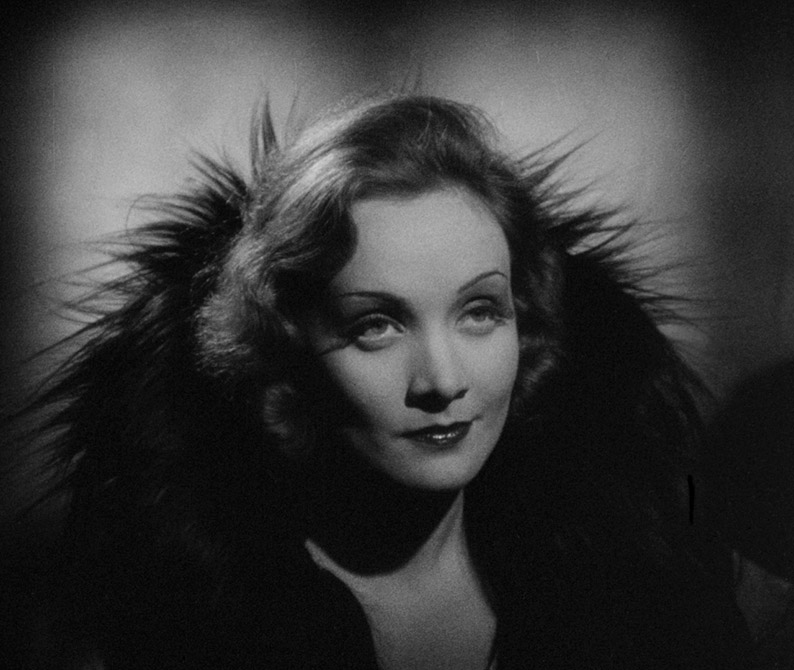
When I was at film school in my late teens, there was what nowadays feels like a curious lack of insistence that students gain a wider appreciation of cinema than a weekly trip to see what was playing locally. If you wanted to see the films that shaped the medium as we knew it or get a wider appreciation of just what it was capable of producing – at least at the college – then your best bet by far was the weekly film studies class. But get this, it was optional, and because it was an evening class and many of the students on the course thought they knew everything they needed to know about filmmaking from watching contemporary Hollywood movies, few of them attended. The fact the class was open to students of any course did help to bump up the numbers a bit, but come on. You're studying film at a time when you couldn't just buy a disc or load up Netflix and you're offered the chance to see a film a week that you've sometimes never even heard of, and you pass?
The class was run by a Bob Harris-voiced man named Paul from whom I learned a lot and with whom I had many a fascinating conversation. At the start of each term he would post a list of the films to be screened, complete with their year of release and the name of the director, on the film production and TV studio noticeboards. One term he broke with his tradition of showing a film by a different filmmaker each week by screening four films in a row by Josef von Sternberg, whose work I was only vague aware of through an iconic photo of a top-hatted Marlene Dietrich on stage in The Blue Angel, which just happened to be one of the films being screened. I knew I wouldn't be able to make it to one of them but looked forward to catching the others. Not so most of my fellow students, one of whom responded by writing on the programme, "Is this guy von Sternberg's brother or something?" Oh boy. The three films I did see were The Blue Angel, Blonde Venus and The Scarlet Empress, but I had to dig out some old diaries to confirm the second two. It was, as I said, a long time ago. It probably didn't help that the films were screened on 16mm on a projector that clattered noisily only feet from where we were sitting, while the sound was fed to a single tinny speaker located in the projector's detachable casing. The films also tended to be supplied on two or three reels, which required a five minute break at sometimes inopportune moments to pull the completed reel off and thread the next one up. All these year later I tried to recall the films in any detail and struggled, and watching them again was thus almost like seeing them for the first time. This, it turned out, was no bad thing at all. Quite why I never hunted out these and other von Sternberg films again in the intervening years is an inaction that I have no credible excuse for.
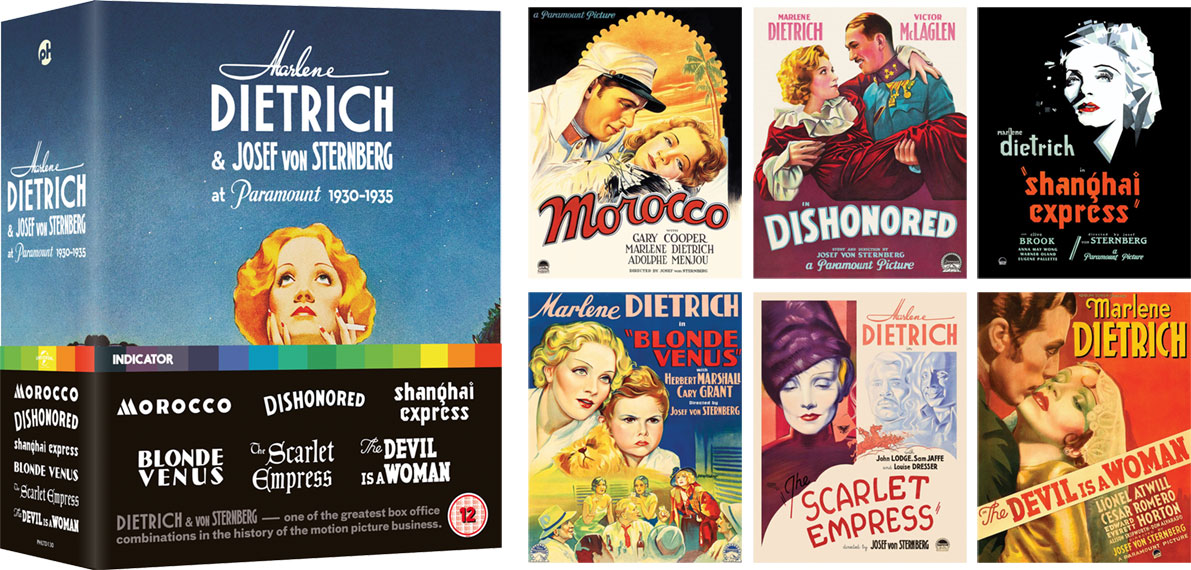
Marlene Dietrich & Josef von Sternberg at Paramount, 1930-1935 is a Blu-ray box set that brings together all six Hollywood collaborations between Josef von Sternberg and Marlene Dietrich, whom the director had plucked from virtual obscurity and made into a star with The Blue Angel. Unlike so many other multi-film collections, all six here are extraordinary in their own way, not just for their boundary-pushing, pre-code eroticism and adult themes, but also for their storytelling, for their focus on character, for the precision of the filmmaking and, yes, for Marlene Dietrich, whose charisma and talent is a dominant factor here. This review itself is late, as ever, primarily because personal circumstances prevented me from even starting work on it before the release date, but also because after swearing I'd only cover each film briefly to expediate the review's completion, as soon as I started watching them I knew this would be an unachievable goal. I'm also aware that the cinema of Josef von Sternberg has been extensively written about by scholars who have spent considerably more time studying these films than I have been able to so far give them, and by deliberately avoiding any of these essays before penning my own appreciation I can absolutely guarantee that I've had a few "oh wow, can you believe that?" responses to elements that have been talked about and analysed for years by others. For that, I apologise, but I'd also urge anyone who has a "well, duh" reaction to this to think back to the very first time they encountered these films and the response it prompted in them. I also chose to review each film immediate after I watched it, which means that I don't address (or even become properly aware) of the motifs that run through all six films until I get to the later titles, and chose not to go back and amend the earlier reviews to include a discussion on them there.
We tend to vary how we cover box sets on the site, but as there isn't the sheer volume of extras that Gort had to juggle on Indicator's Norman J. Warren box set, I've elected to cover the films first in chronological order, then the technical specifications and then the special features for all of the discs. Thus if it's the transfers and the extras you're interested in, hop to the last page.
Somehow, I'd never seen Morocco before, despite it being the Hollywood debut of Marlene Dietrich. Perhaps because of this, I've also avoided reading much about it either. As it turns out, knowing little about it was a great way to go in to this extraordinary film, as I somehow didn't take not of the year of its release and thus had production Code-shaped expectations about its content. It didn't take long to have them blown to smithereens. I'll get to the scene in question in a second, and as ever, if you've not seen the film and want to see it for the first time with little foreknowledge of what's to come, skip this review and go on to the next one. Just know that the film is superb and a hell of a way to kick off this box set.
The majority of the film takes place in city of Mogador in western Morocco, where a company of French Legionnaires is based and which, as the film begins, has just returned from patrol. It quickly becomes evident that Private Tom Brown (a young Gary Cooper) is not popular with the shouty Sergeant Tatoche (Francis McDonald) and that he has a bit of a thing for the ladies, one of whom he is quietly flirting with when Tatoche descends on him to loudly ball him out. She's also flirting with him. Oh boy is she flirting with him. Arriving in the region by boat, meanwhile, is unhappy cabaret singer Amy Jolly (Marlene Dietrich), who is approached by wealthy fellow traveller La Bessiere (Adolphe Menjou), with an offer to be her guide to an area he apparently knows well. Amy politely turns down La Bessiere's offer but accepts his card, which she then disposes of with such elegance that I'm already planning to imitate her actions in the future in the hope of looking even a fraction as cool.
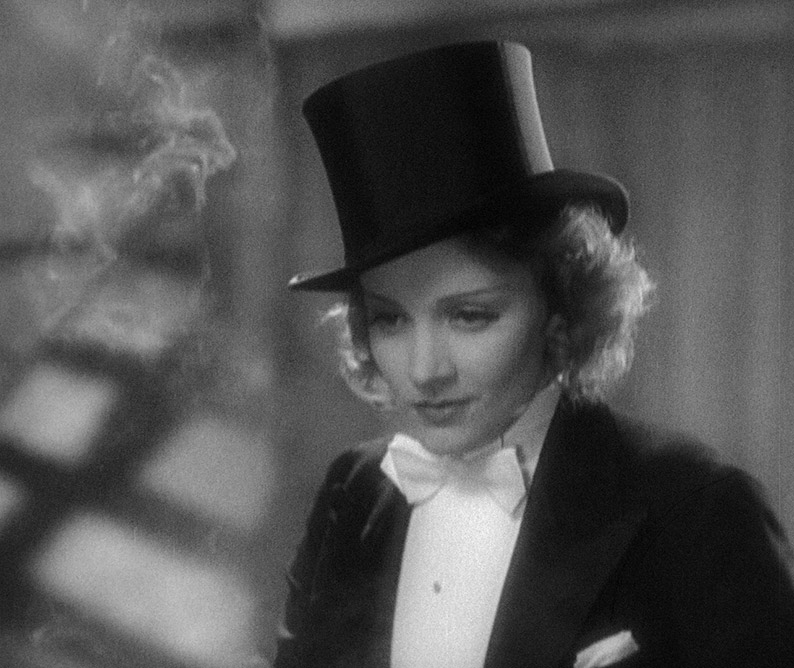
Amy has landed a job as the new headliner at a local nightclub, and on the evening of her debut both La Bessiere and Tom are coincidentally in the audience. La Bessiere is glad-handing prominent associates, while Tom is there to meet the women he was flirting with earlier, a brassy young lady who only speaks Spanish and whom Tom has clearly known for some time. When Amy hits the stage, she does so dressed in top hat a tails, and it looks so great on her that it didn't even occur to me until later that she is essentially in drag. If this does somehow give you a start then you definitely won't be ready for what happens next. After an intrigued Tom has calmed rowdy punters by pushing and threatening to bottle individuals into silence, Amy sings her song, then wanders the audience, drifting over to a table at which a Legion officer, his well-to-do friend and their wives are sitting. She accepts a drink and then takes an interest in one of the women, and I mean really takes an interest. She seems about to depart when she walks back, reaches over and takes a flower from the woman's hair. "May I have this?" she asks, to which the woman cheerfully responds, "Of course." Amy then leans over and kisses the woman on the lips. I'm sorry, what? When was this made again? 1930? A few seconds later Amy throws the flower to Tom in a move whose timing feels like a coded declaration of Amy's – and indeed Dietrich's – bisexuality. 1930. Outstanding.
A short while later she's back and now dressed in what is essentially a swimsuit and selling overpriced apples to drooling male audience members, having first sung a short song that underlines the link between the fruit and the biblical original sin. When she reaches Tom, he pushes and she seems to rebuff him, but as she departs she hands him a key to her one-room apartment. He's on his way there when he's accosted by a woman (Eve Southern) whose head is covered for secrecy and who turns out to be the wife of Tom's senior officer Adjutant Caesar (Ullrich Haupt), with whom he exchanged furtive waves at the nightclub and is clearly having an affair. Tom brushes her off to visit Amy, who is still carrying the weight of some unspecified disappointment in her past, eventually asking him to leave because she's starting to like him. After he does, however, she chases after him and, well, the path to true love is never straightforward, but in Morocco it's even more complicated than usual with no guarantees for a happy resolution for anyone involved.
It goes something like this. Tom is in love with Amy but is too much of an insecure womaniser to just come out and admit it, with the result that his advances seem driven more by lust than love. La Bessiere also falls in love with Amy but he is not shy about proclaiming it to her face. Amy, meanwhile, really falls for Tom, but has to weigh up his seeming reluctance to admit his true feelings against life of comfort and security that La Bessiere offers. But there's more. Both Amy and Tom misread signs that suggest a serious relationship between them has no real future, and while La Bessiere's courting of Amy with expensive jewellery and a marriage proposal may seem to cast him as the stereotypical shallow rich disrupter of true romance, it turns out he is so in love with Amy that he'll do anything to make her happy, even if that means possibly losing her to Tom, who of course has no idea that this is the case.
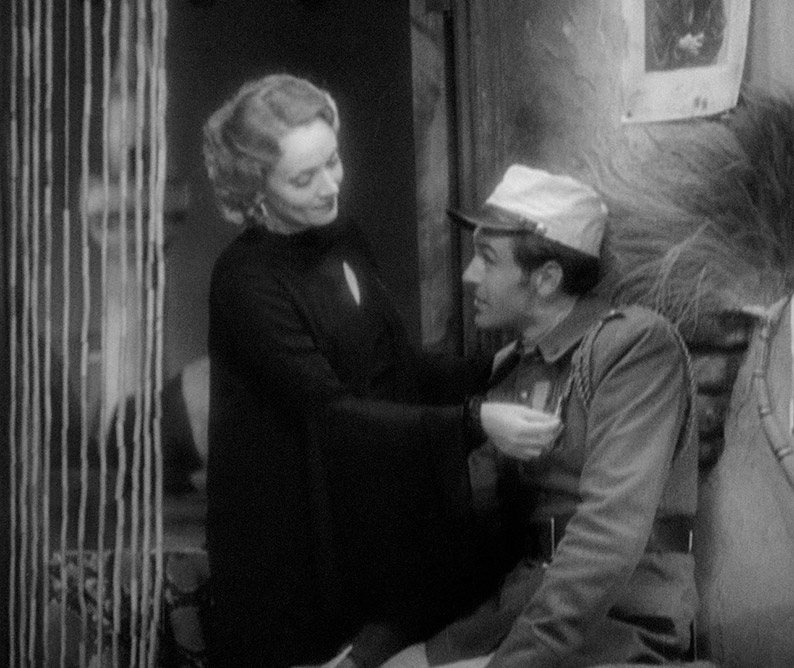
The love triangle itself is impeccably handled and by avoiding clichés that had yet to become clichés it still feels fresher than any number of subsequent film takes on the same situation. I really appreciated learning about the lead characters' back-stories primarily from what we observe or what they infer, whether it be Amy's Garbo-like sadness on her arrival in Mogador or the fact that women seem to flock to Tom like bees to a honeypot almost everywhere he goes, and sometimes have to be almost swatted away to prompt their departure. Familiar situations also rarely play out as expected. A prime example comes early when Tom uses the key given to him at the nightclub to visit Amy in her room, and the romance we expect to explode stumbles before it's had a chance to begin. It also contains what is unquestionably the film's most eloquent speech, when the sorrowful Amy responds to Tom's proclamation that he ditched the past when he joined the Legion with this little beauty:
"There's a 'foreign legion' of women, too. But we have no uniforms, no flags. And no medals when we are brave. No wound stripes when we are hurt."
I'm guessing this comes straight from Benno Vigny's source novel Amy Jolly, but if not, full marks to scriptwriter Jules Furthman. Even if it was, full marks to Furthman and von Sternberg for the decision to include it and to von Sternberg and Dietrich for the exquisite pacing of its delivery. This scene also includes a couple of neat bits of almost throwaway of business that are typical of the film's attention to small detail. The first occurs when Tom enters the room and reaches behind him for a fan that is not where he expected to be, and later tosses it back to its place of origin place, it falls short and he has to bend down to retrieve. These small moments feel almost like out-take mistakes around which Cooper is improvising, but give both actions an unexpected air of reality.
All three lead actors are terrific. In a film in which many of the female supporting roles seem to have been cast on the basis of the performers' allure, Marlene Dietrich is still a beacon of sometimes sorrowful sensuality, whether eyeing up the wife of a customer whilst dressed in a traditionally male costume or employing subtle gazes and fluid body language to underscore the meaning of that above-quoted speech. Gary Cooper plays Tom as a sometimes self-absorbed twerp but always keeps him on the right side of likeable, even if there are times when I wanted to slap him to make him realise what he's letting slip through his fingers. Perhaps the hardest job falls to Adolphe Menjou, who as La Bessiere initially comes across as one of those rich gits who thinks they can buy anything by throwing money at it, but later does a storming job of portraying a man trying to remain stoic even though his heart is at risk of breaking. It's this suppressed disappointment and sense of impending loss that makes most gut-wrenching cutaway in the film – which I won't spoil as it comes late in the story but involves a shot of La Bessiere at a dinner party – deliver such a kick even though it is on screen for just 54 frames (yep, I timed it).
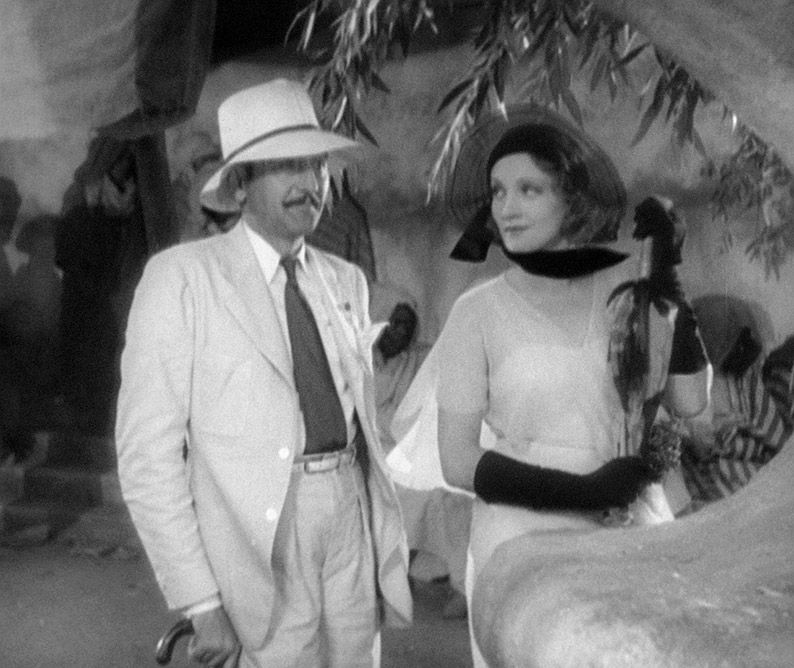
Von Sternberg's direction is masterful throughout but rarely if ever draws attention to itself. His impeccable handling of the actors and even the background action is matched by the thought and imagination that clearly went into his and master cinematographer Lee Garmes' camera placement and movement. The decision to frame Tom's introduction through a market stall whose dangling jewellery partly covers his face at first seems an odd one, at least until you realise that this is subtle foreshadowing for what will shortly unfold. Later, when the Legion returns from an operation in which lives were lost, the dolly shots that track with the frantic Amy as she rushes through the sea of marching men are executed with a smoothness and precision that feels ahead of its time, at least for film made so early in the sound era. The film even kicks off with what me might later regard as a Python-esque bit of humour, as a merchant struggles desperately and hopelessly to pull his rigidly stubborn mule out of the path of the approaching column of marching Legionnaires. Most of all, though, von Sternberg makes us care and care deeply about his characters, about their fate and about how a love triangle that you absolutely know cannot end happily for all with unfold and resolve, and even whether it will be resolved at all. It's a beautifully executed and smoulderingly sensual tale of love and the true meaning of commitment, and as perfect an introduction to the work of this remarkable director-actor partnership as you could hope for.
I have two small quibbles with the second Hollywood collaboration between Marlene Dietrich and Josef von Sternberg, and both relate to an opening caption that states that an agent with the codename X-27 "might have become the greatest spy in history...if X-27 had not been a woman." Oh, really? First, I take obvious exception to the preposterous notion that a spy could never be as great as her counterpart simply because she was born with two X chromosomes. Secondly, given that she's quickly sussed for what she is by everyone she's assigned to investigate, I can't see how she could ever have been a candidate for Greatest Spy in History, despite the clear influence of notorious real-world spy, Mata Hari. Surely the best qualification for that title would be to never have been identified as a spy at all. I'll be coming back to this below in a section that will carry a spoiler warning. There are a couple of those in this review. Can't be avoided. In all other respects, however, Dishonored (and yes, it's an American film so has the American spelling of that particular English word) is another prime example of why von Sternberg and Dietrich was a match made in heaven.
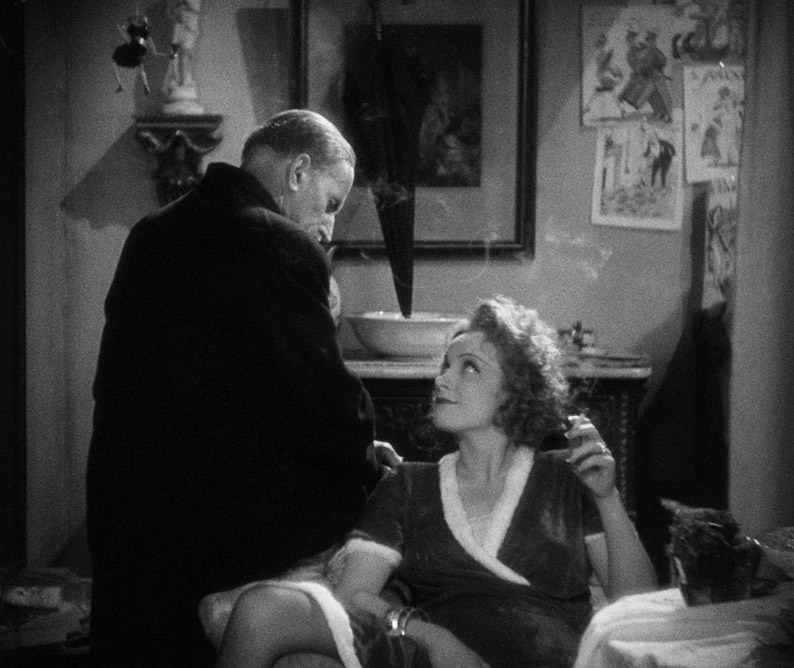
On paper, the opening scene seems straightforward enough, but it contains so much detail and clever texturing that I just know I'm about to write too much about it. It opens unconventionally on a long-held close-up of rain dripping from an ornamental rooftop, which is followed by a shot of two stockinged legs standing on the rain-soaked street below as their elegantly dressed owner lifts her coat and adjusts one of the garments. We're in Vienna in 1917 during the later stages of the First World War and have just been introduced to our lead character, Marie Kolverer (Marlene Dietrich), who then joins a crowd of onlookers at the door of an apartment block as woman's body is carried out by the emergency services. The third suicide by gas in that block this year we discover. "You're gonna go the same way," says one particularly uncharitable git to Marie. "No I'm not," she confidently replies. "I'm not afraid of life. Although I am not afraid of death either." This proclamation catches the ear of a stern-faced, middle-aged and moustachioed man (Gustav von Seyffertitz), who approaches her and asks if she would like to go somewhere, "away from this unpleasant house." "It's not always so unpleasant, I live here" she replies with a smile so bewitching thank I dribbled onto my notes. She invites the man in, and what follows is an absolute treasure trove of incidental and character detail and subtle suggestion: the time Marie takes to light the room's only gas lamp while the man slowly wanders the room in the dark; the almost ritualistic way that she lifts her veil to blow out the match; the water jug that's lifted so the man can place his umbrella in the bowl it sits in; the small dolls dangling on elasticated threads that are brushed aside then seem to dance to the tune that the man plays on the piano; the saucily invitational manner in which Marie flops down into a chair after changing into a bathrobe, her intentions underscored when she says with a wry smile, "I've done enough talking for tonight."
If you haven't worked out what Marie and the three suicide victims do for a living by now, I'm assuming you've led a very sheltered and pure existence. If that's the case, this film's probably not for you. As it turns out, the man is not in the market for the services she offers, but is scouting for candidates for espionage work against Austria. Marie is a tad surprised by this admission, but seems intrigued and picks up two glasses and a bottle of wine to seal the deal. Unfortunately the bottle is empty and Marie thus subtly taps the man for some money to buy a fresh one. When she returns, she has a policeman with her and turns the man in. I knew in advance that this was a spy story, but didn't see this coming. This is turned around again once the man shows the policeman his credentials and gives him a card to pass to Marie with the request that she come and see him tomorrow. The man, it turns out, is Head of the Austrian Secret Service and he has a proposal for this principled patriot, one that requires the allure of an attractive woman that will put her life in danger but could also reap her a considerable reward. Marie accepts, not for the promised life of luxury but for the chance to serve her country in the name of her husband, who was killed in action.
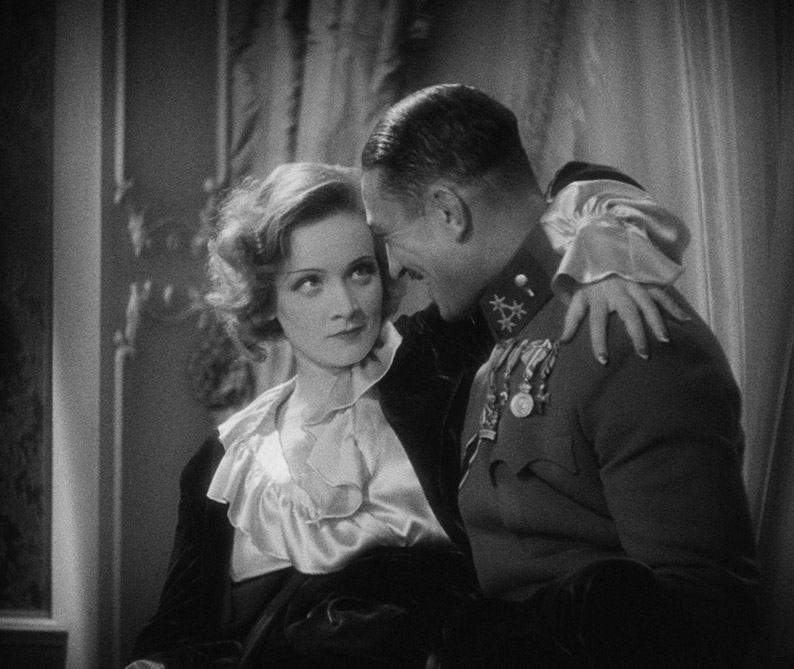
This somewhat exhaustive description of the opening scenes is the setup for a plot I have no intention of revealing in similar detail, as that's the meat of the film and where many of its best surprises and breaks with tradition lie. Plots to seduce potential traitors and spies are uncovered with surprising speed, while operatives on both sides admit their complicity to each other like brothers and sisters-in-arms rather than the hostile enemies they technically are. This approach not only kicks against convention-inspired expectations, it also credits those under investigation with the intelligence they must logically possess to have eluded all attempts to catch them up to this point. And in the case of Russian agent Colonel Kranau (Victor McLaglen), he treats the discovery that Marie is not who she initially seemed as a cue for what plays almost like a game of wits between them, one that he has considerably more experience at playing than this enthusiastic newcomer to the world of international espionage.
Which brings me back to my comments about that opening caption and its suggestion that Marie might not be the greatest spy ever because she is a woman, and be warned because there are spoilers ahead, so if you want to play safe, hop to the next paragraph. All clear? Good. Yes, Marie later lets her emotions instead of her duty dictate her actions, but the key reason this happens is not because she's a woman, but because she didn't even have an hour's worth of training to be a bloody spy! She was asked to do it and she accepted the challenge, and while she proves adept at catching the interest of the men she is charged with targeting, she is not a professional agent and is thus as vulnerable to her emotions as any of us would be in a similar situation. I'll let the idea that her bond with Kranau is only really cemented after he beds her following the assurance that she'll be executed the following morning pass for now – this is, after all, a 90-minute film where relationships that would normally develop over time have to be compressed in order to move the story forward.
Unlike Morocco, this is Dietrich's show from the off and she outshines everyone here, in her effortless sensuality, her winning self-confidence and her suggestive body language and line delivery. When later disguised a bashful maid reacting to the attentions of a randy Russian officer, she delightfully reveals a very different and playful aspect of her personality, playing the part with almost silent movie comedy exaggeration of expression and movement. The supporting cast, meanwhile, is solid enough, despite Gustav von Seyffertitz's habit of barking "Ha!" as the Austrian Secret Service Chief and Victor McLaglen's fondness for delivering lines through an oddly rigid rigor mortis grin.
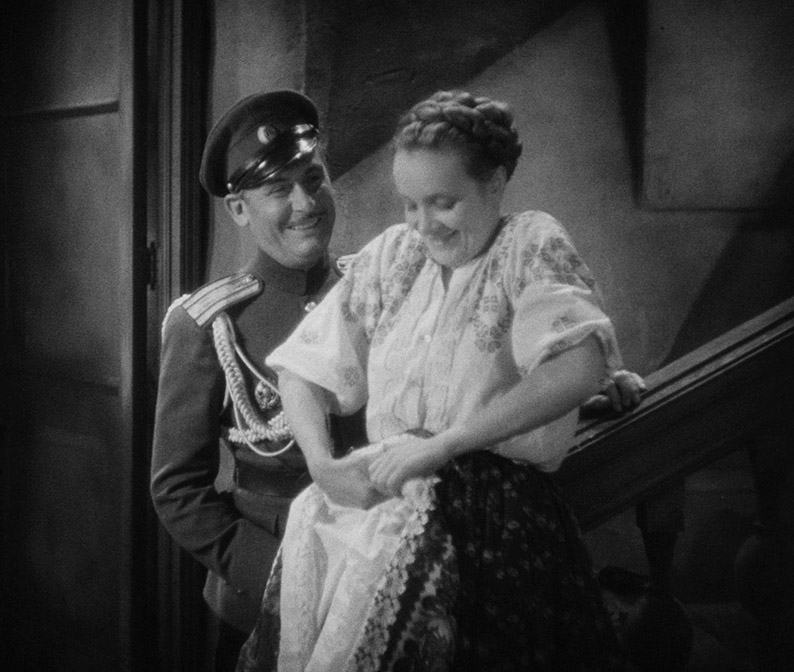
Once again von Sternberg demonstrates a real gift for visual storytelling, texturing scenes with distinctive and evocative detail and staging key moments of narrative development without the crutch of dialogue (the single wide shot of Marie playing the piano surrounded by officials and pausing intermittently to urgently write down remembered fragments of a musical code is a personal favourite). He inventively compensates for budget restrictions, most memorably by suggesting the vibrancy of a party scene through a combination of overlapping imagery and tightly-framed shots of a small number of revellers dancing their way through in a snowstorm of streamers. He also employs an interesting technique of halting a dissolve in midway through the transition so that it becomes a montage of two images, which he uses to link past and present actions or illustrate memory recall on a character's part. This also has the bonus of gently pushing viewers to recognise a link between two events that might otherwise have bypassed them. Shots rarely call attention to themselves, though I can't be the only one who was genuinely startled by the moment when, after shopping the Secret Service Chief to the police, Maria walks forward into discomfortingly extreme facial close-up to vent her emotions on her piano. I can only imagine the impact of this rule-breaking image must have had on a large cinema screen back in 1931.
Dishonored is a compellingly developed and consistently intriguing tale that moves into a different league entirely in its emotionally punishing final act, one I can't discuss in detail without delivering serious spoilers for a sequence you should experience unprepared for maximum impact. If you've not seen the film yet I'd still skip the rest of this paragraph anyway, as I just can't sign off without commenting on some of the things that make this finale one of the most powerful of any American film of the period. It's here that von Sternberg's anti-war message is spelt out with a clarity that nobody can claim to have missed, and here that Marie's supposed feminine failings as a spy are revealed to be driven by a humanitarian belief in doing what is right when forced to choose between personal convictions and prescribed duty. There are shots here whose composition and design tell their own story – the banging of a fateful drum on which the shadows of two raised and ready rifle barrels fall – while a gentle response to being offered a blindfold put the biggest of lumps in my already quivering throat. I'd argue that Dishonored is not quite as fluid in its storytelling as Morocco, but it's still an extraordinary showcase for the von Sternberg-Dietrich partnership, and one whose devastating finale is likely going to stay with me for years to come.
|